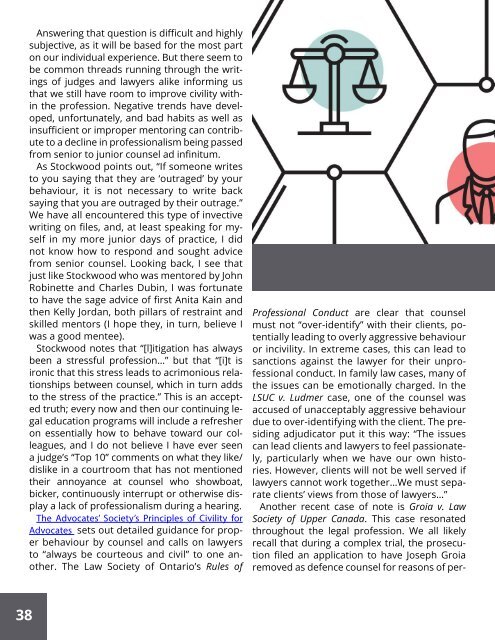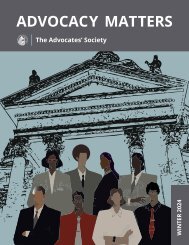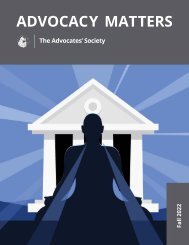Advocacy Matters - Spring 2020
Keep up to date on what your fellow Society members have to say in Advocacy Matters.
Keep up to date on what your fellow Society members have to say in Advocacy Matters.
You also want an ePaper? Increase the reach of your titles
YUMPU automatically turns print PDFs into web optimized ePapers that Google loves.
Answering that question is difficult and highly<br />
subjective, as it will be based for the most part<br />
on our individual experience. But there seem to<br />
be common threads running through the writings<br />
of judges and lawyers alike informing us<br />
that we still have room to improve civility within<br />
the profession. Negative trends have developed,<br />
unfortunately, and bad habits as well as<br />
insufficient or improper mentoring can contribute<br />
to a decline in professionalism being passed<br />
from senior to junior counsel ad infinitum.<br />
As Stockwood points out, “If someone writes<br />
to you saying that they are ‘outraged’ by your<br />
behaviour, it is not necessary to write back<br />
saying that you are outraged by their outrage.”<br />
We have all encountered this type of invective<br />
writing on files, and, at least speaking for myself<br />
in my more junior days of practice, I did<br />
not know how to respond and sought advice<br />
from senior counsel. Looking back, I see that<br />
just like Stockwood who was mentored by John<br />
Robinette and Charles Dubin, I was fortunate<br />
to have the sage advice of first Anita Kain and<br />
then Kelly Jordan, both pillars of restraint and<br />
skilled mentors (I hope they, in turn, believe I<br />
was a good mentee).<br />
Stockwood notes that “[l]itigation has always<br />
been a stressful profession…” but that “[i]t is<br />
ironic that this stress leads to acrimonious relationships<br />
between counsel, which in turn adds<br />
to the stress of the practice.” This is an accepted<br />
truth; every now and then our continuing legal<br />
education programs will include a refresher<br />
on essentially how to behave toward our colleagues,<br />
and I do not believe I have ever seen<br />
a judge’s “Top 10” comments on what they like/<br />
dislike in a courtroom that has not mentioned<br />
their annoyance at counsel who showboat,<br />
bicker, continuously interrupt or otherwise display<br />
a lack of professionalism during a hearing.<br />
The Advocates’ Society’s Principles of Civility for<br />
Advocates sets out detailed guidance for proper<br />
behaviour by counsel and calls on lawyers<br />
to “always be courteous and civil” to one another.<br />
The Law Society of Ontario’s Rules of<br />
Professional Conduct are clear that counsel<br />
must not “over-identify” with their clients, potentially<br />
leading to overly aggressive behaviour<br />
or incivility. In extreme cases, this can lead to<br />
sanctions against the lawyer for their unprofessional<br />
conduct. In family law cases, many of<br />
the issues can be emotionally charged. In the<br />
LSUC v. Ludmer case, one of the counsel was<br />
accused of unacceptably aggressive behaviour<br />
due to over-identifying with the client. The presiding<br />
adjudicator put it this way: “The issues<br />
can lead clients and lawyers to feel passionately,<br />
particularly when we have our own histories.<br />
However, clients will not be well served if<br />
lawyers cannot work together…We must separate<br />
clients’ views from those of lawyers…”<br />
Another recent case of note is Groia v. Law<br />
Society of Upper Canada. This case resonated<br />
throughout the legal profession. We all likely<br />
recall that during a complex trial, the prosecution<br />
filed an application to have Joseph Groia<br />
removed as defence counsel for reasons of perceived<br />
misconduct. Mr. Groia remained on the<br />
case, but later had to defend himself in a Law<br />
Society disciplinary proceeding which wound its<br />
way to the Supreme Court. During that process<br />
the SCC recognized that incivility is “…inherently<br />
contextual and fact-specific.” The court noted<br />
that trials are “often hard fought” and “not tea<br />
parties.” Mr. Groia was eventually successful in<br />
his appeal, and he was also successful in bringing<br />
once again to the fore the debate between<br />
counsel and judges as to what does and does<br />
not cross the line. As counsel, perhaps the best<br />
adage we can strive for is to treat the other side<br />
the way we would expect and want to be treated,<br />
while taking all steps we deem reasonable<br />
and necessary in our job as advocates.<br />
Perhaps not as prevalent or widely talked<br />
about in Stockwood’s time but receiving more<br />
attention today is the issue of mental health in<br />
the practice of law. Lawyers need to be aware<br />
of potential mental health issues that can affect<br />
their clients’ behaviour; in extreme cases, clients’<br />
mental health issues can affect their ability to<br />
understand and participate in litigation, including<br />
giving instructions to counsel. Management<br />
of these types of situations necessarily falls to<br />
counsel, and guidelines are provided in Rule 3.2-<br />
9 of the Rules of Professional Conduct.<br />
Counsel, perhaps particularly those practicing<br />
with families in matrimonial cases, must remember<br />
that their actions and words can influence<br />
how their clients view the justice system. This<br />
can be a heavy burden to bear, especially when<br />
dealing with difficult personalities or issues and<br />
striving for the best outcome for one’s client. My<br />
experience has taught me—as, it seems, David<br />
Stockwood’s taught him— that fraught situations<br />
are rarely if ever made better by negative<br />
escalation; we must strive to demonstrate civility<br />
in the face of adversity and lead by good<br />
behaviour. Perhaps now more than ever, during<br />
this strange time of pandemic and the workarounds<br />
and stressors that have come with that,<br />
counsels’ duty to civility may be truly tested.<br />
38 39


















